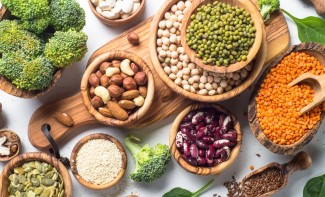
If you are choosing to eat fewer meat-based meals and replacing them with plant-based meals, there is one question that may come to mind or may be asked by your friends and family. How are you going to get enough protein? This is a common misconception that has been associated with a plant-based diet for many years. The good news: it’s simply a myth.
What is Protein?
Protein is important for the building, maintenance, and repair of tissues. It also plays important roles in our body’s immune system, red blood cells, hormones, and enzymes. Proteins are made from chains of different amino acids in varying sequences. Plants and microorganisms can produce all the amino acids, also known as building blocks of protein. Our bodies can make all but nine of these amino acids, and so we need to get these nine from the foods we eat, thus referred to as "essential" amino acids. All plants contain amino acids in varying proportions; therefore, all plant foods contain protein (some in higher concentrations than others). A variety of vegetables, grains, and legumes can provide all of the essential amino acids our bodies need. It was once thought that various plant foods had to be eaten together to get their full protein value, otherwise known as “protein combining” or “protein complementing”. We now know that intentional combining is not necessary to obtain all of the essential amino acids.1 As long as the diet contains a variety of grains, legumes, and vegetables, protein requirements are easily met.
How much protein do we really need?
The Recommended Dietary Allowance (RDA) for protein is 0.8 grams per kilograms of weight.2 To find out your individual protein need, use this calculation: Body weight (in pounds) X 0.36 = recommended protein intake (in grams) However, the RDA provides a very large margin of safety. The body’s actual needs are lower for most people. Protein needs are increased during certain parts of our lifespan. For example protein needs are increased for growing children, highly active individuals, and during pregnancy and lactation. As these groups require additional calories, increased protein requirements are easily met through eating larger amounts of food daily. Extra servings of high protein plant foods such as legumes, tofu or tempeh, and veggie meats can help meet needs that go beyond the current RDA. Dairy products can also be consumed in moderation (if not allergic).
Plants are rich in protein
Plants are by nature rich sources of protein as they are made up of structural cells, hormones and enzymes.4 In fact, plants are so rich in protein that they meet the needs of the earth’s largest animals: elephants, giraffes, hippopotamuses, gorillas, cows, and horses. If these large animals with big, strong muscles can get adequate protein from plants, then so can we.
What are some high protein sources?
These high protein plant foods are also loaded with essential nutrients:
- Legumes - such as dried beans, peas, sprouts and alfalfa.
- Dark green leafy vegetables - such as spinach, romaine lettuce, kale, and chard.
- Other vegetables - such as asparagus, broccoli, and Spirulina (blue-green sea algae).
- Grains - such as quinoa (tiny cream colored seeds; cooks like a grain, fluffy texture, mild, nutty taste).
- Nuts & Seeds - such as almonds, Brazil nuts, peanuts, sunflower seeds, hemp seeds and pumpkin seeds.
- Veggie meats – such as veggie burgers & dogs, veggie sausages & bacon, veggie chicken & beef strips, and more.
In general, plant proteins are healthier because of the other food components that come with them. All plant-based proteins are accompanied by fiber, versus animal sources of protein which have essentially no fiber. Plants also contain antioxidants and cancer-fighting nutrients not found in animal foods. And of course, plant-based proteins also tend to be low in fat and have zero cholesterol. When consuming adequate calories from a balanced, wholesome plant-based diet consisting of vegetables, grains, legumes, nuts and seeds… protein deficiency is very unlikely.
- Position of the American Dietetic Association: vegetarian diets. J Amer Diet Assoc 2003 Jun;103(6):748-65.
- Dietary Reference Intakes for Energy, Carbohydrate, Fiber, Fat, Fatty Acids, Cholesterol, Protein, and Amino Acids (Macronutrients) (2002); Food and Nutrition Board (FNB), Institute of Medicine (IOM).
- McDougall JA. When Friends Ask: Where Do You Get Your Protein? April 2007.